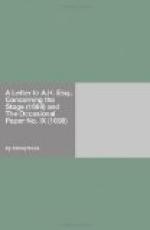Were we daily to be in the House of Feasting and the soberest Mirth, our Spirits wou’d grow by degrees so frothy and light, that we shou’d not easily bring them to settle again on any thing that was worthy our care: Without something now and then to raise them a little, they wou’d be dull and unactive, but all Relaxation wou’d make them too airy, and of no sort of Use. They wou’d not serve to keep up our Souls from sinking under the pleasures of sense, but so unawares betray us into them, by loosning the strength we have to resist, and improving the Charm, that tho’ we supposed the whole Concern of the Stage to set out all Virtuous at first, we cou’d not expect its continuing long in that primitive State, before it run into some foolish Excess. For if Mens coming often and many together, on business, or kind and friendly Occasions, is apt to lay a snare in their Way; Nay if Societies form’d for the very promotion of Virtue; and ti’d to all the Discipline of it, are yet hardly kept from growing irregular: What can we hope from such places of Concourse, where Imagination expects to be rais’d, and the End is Delight?
But I doubt we never began so fairly as this, because our present Corruption is greater, than can well be conceiv’d to have sprung from a Root that had at first no Bitterness in it.
Was there nothing ill in the Representations themselves, yet there is so much of that by agreement of All, in the Vain Behaviour of those that are there; that they must needs be very fond of a Play, that can bring themselves to sit often and long in such Company for it.
And yet one wou’d think sufficient care had been taken by those on the Stage, to heighten and please the most vicious Tast. They appear to have study’d all the Arts of an easie Defilement, and to have left out no Colours that were likely to Stain. And that these may be sure to sink deep enough, their business is to discharge the Heart of all its pure and native Impressions, that it may be the better disposed to receive what Tincture they please.
Men must here begin to unlearn what their Parents and grave Instructors have told them in the very tenderest part of their care; and learn to suspect some of their first and plainest Notions of things. They are now to be taught how they might Be, without a Creator; and how, now they are, they may live best without any Dependance on his Providence. They are call’d to doubt of the Existence of God, or if that be allow’d them, ’tis only to question what Notice he takes: His Wise Providence at every turn is charged with Neglect, and often not for, that which has something of Precedent, supporting the Wicked, but which is dreadfully New disappointing their Lusts. Things they are no longer ashamed of, but publickly own, without so much as pretending to hide them from God, whom they are not afraid to treat as blind, or as giving Consent.




